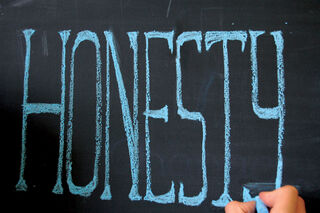Deception
The Evolution of Honesty
New research explains why we tend to tell the truth instead of lie.
Posted December 18, 2020 Reviewed by Gary Drevitch

As one who studies deception for a living, I am often asked why some people seem to lie a lot. That question always seemed like a fair one to me. We can all immediately recall examples of lying politicians, corrupt businessmen, conniving lovers, and duplicitous coworkers. These deceivers grab our attention because their dishonesty is so far outside the norms of society. We feel fortunate that these big liars are rare, with most people in our communities acting just like us—honest. But not long ago, another question crossed my mind: Why are most people so honest? Sure, there are some big liars out there, but most people are honest most of the time, even when being dishonest might help them get ahead. Why, when lying and deception often would allow one to gain an advantage, would honesty be such a central feature of human nature? The tendency to be honest with those around us seems so pervasive that it is almost as if the tendency is baked into human psychology along with sociality, curiosity, language, and other nearly universal traits. Researchers have recently begun to explore this question from an evolutionary perspective.
Competing Goals
When two individuals interact, they often have divergent goals. When buying a car, the salesperson and the customer have a shared goal of facilitating the transaction, but they also have subordinate goals that are diametrically opposed. The salesperson wants to sell the car for a high price, and the customer wants to purchase the car for a low price. Similarly, we can see these opposing goals in romantic relationships with each partner prioritizing some goals such as marriage, having kids, buying a new car, etc., that may come into conflict with the goals of the other partner. Once a conflict of interests emerges, each person may use a combination of strategies to protect their interests. They negotiate, argue, beg, make tradeoffs, share, fight, leave, compromise, etc. One such strategy is to deceive. If Sylvia wants to have an affair, but her spouse insists on monogamy, Sylvia can lie and say that she is spending the evening with friends. Likewise, if John wants the day off from work, and his boss wants him to work, John can simply lie and say that he is sick. People can use deception to gain the upper hand in a struggle for their own interests when those interests come into conflict with another’s.
Natural Honesty
But it turns out that most people are honest. In some of my own studies, I have found that most people report lying very rarely, even when there is no serious prospect of being caught if they lied. In laboratory studies on deception, people tend to honestly report their performance on a dice-rolling task, when lying would profit them financially. Even those people who do lie tend to do so in ways that fail to maximize their financial advantage. Even more perplexing, people who actually do come out ahead in such games sometimes lie in order to appear less successful than they actually were. So why do people behave so prosocially when there are clear financial incentives to lie? Some researchers have argued that we humans have evolved prosocial preferences, both for others and for ourselves. We have evolved to cooperate. Why would we evolve prosocial tendencies when Machiavellian tendencies (the tendency to exploit, manipulate, and deceive, others in order to achieve our own goals) would seem to obviously benefit one’s selfish interests? Evolutionary theory would argue that the honest approach must yield some adaptive advantage. That is, being prosocially honest must, in the end, produce more benefits to the individual than the Machiavellian approach.
Cooperation and Survival
The key to understanding this puzzle seems to be in the power of cooperation. Humans are a social species. There is pretty compelling evidence that without cooperation, people are much less likely to survive and thrive. By studying hunter-gatherers, anthropologists and evolutionary psychologists have discovered that our Paleolithic ancestors would be very unlikely to live long if they attempted to go it alone. In hunter-gatherer tribes, individuals are often left helpless by injuries and illness. Without cooperative help from others, these sick and hurt people would die of starvation. Likewise, without communal food gathering and sharing, each individual would not survive the feast and famine cycle of unpredictable hunting and gathering. Together, though, they share their bounty so that when each one inevitably has a bad day, the other members of the group will help them survive.
Evolution of Honesty
But before people will want to cooperate with you, they will need to know that you will reciprocate. People are vigilant observers of others’ behaviors. We note when someone is a cheat, when they are dishonest, or when they are cheap. We also notice when they share, when they pull their weight, and when they are genuine. We selectively cooperate with those who are themselves good cooperators. So, in order to be in productive cooperative relationships with others, we must demonstrate that we are good teammates. We do this by managing our reputations. We go out of our way to show people that we carry the credentials of a good cooperator. We showcase our warmth, our loyalty, and our honesty. The survival requisite of group living has driven people to place a premium on marketing themselves as reliable cooperators. But we need not even be consciously aware of this strategic cooperative machinery driving our behavior. Instead, we usually only notice the proximate gears that drive our behavior. We notice the guilt and shame we feel when we betray someone. We feel queasy when we fail to act fairly. We feel a loss of self-esteem when we recognize that we have been lying. Whether these drivers of honesty are hardwired into our brains or whether they are products of cultural evolution is still a matter of debate, but there does seem to be a compelling case that we humans, at least the majority of us, have evolved a tendency toward honesty, not deception.
References
Heintz, C., Karabegovic, M., &, Molnar, A. (2016). The co-evolution of honesty and strategic vigilance. Frontiers in Psychology, 7, 1503. doi: 10.3389/fpsyg.2016.01503
Henrich, J. (2018). Human cooperation: The hunter-gatherer puzzle. Current Biology, 28(19), 1143-1145. https://doi.org/10.1016/j.cub.2018.08.005.
Oesch, N. (2016). Deception as a derived function of language. Frontiers in Psychology, 7, 1485. doi:10.3389/fpsyg.2016.01485


